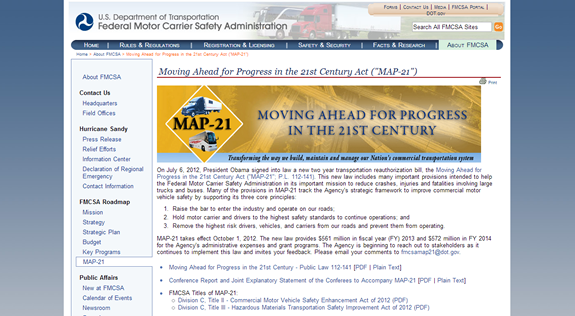It used to be that the surety bond required for freight brokers was at $10,000. Soon, it’ll be $75,000, thanks to legislation signed by the President in July of last year and which will take effect in July of 2013.
The new business cost drew some howls from small freight brokerages, but since there’s some months yet before the law takes effect, you may want to know what the updated surety bond requirement would mean for your business.
History of the Freight Broker Surety Bond
The bond requirement that freight brokers have to comply with to obtain their license came about as early as the 30s. Back then, it was designed to protect shippers from unscrupulous brokers. In the 80s, judicial action extended that protection to carriers to ensure that freight brokers paid the truckers for services rendered.
Many decades later, around 2004, there was a petition from a major trucking association to further increase the bond set in the 70s at $10,000 to as much as $500,000. They argued that the current surety bond amount is insufficient to cover their losses when their trucks aren’t paid by fly-by-night freight brokers—the rates have to account for inflation, too.
One counter argument after another shelved the proposal, until three big industry associations usually at odds with one another—the Owner Operators Independent Drivers Association (OOIDA), the American Trucking Association (ATA) and the Transportation Intermediaries Association (TIA)—were able to iron out an agreement for the increase. Their lobbying in Congress yielded fruit when the bill increasing the surety bond passed.
There’s some comfort to what some legal experts are saying. The law on the new freight broker surety bond may actually take effect several months more after July 2013.
The regulation will still undergo public comment, re-evaluation and rewriting (based on the comments submitted) before freight brokers will actually shell out the necessary expense. And then there might be legal challenges to the new law, setting back its implementation to a few months more. Industry insiders are saying the new surety bond may take effect in 2014 or even in 2015. Freight brokers will be given enough time to raise the funds to comply with the new regulations.
How the New Surety Bond Will Affect Freight Brokers
Again, the increase in the surety bond requirement is supposed to protect shippers and carriers from shady freight brokers. The higher rates are designed to weed out fraud in the industry and keep motor carriers from taking on losses when freight brokers fail to pay them.
Some small freight brokerages though are accusing the big brokerages behind TIA—a professional association of freight brokers—that they’re trying to eliminate competition from small operations (the ‘mom and pop’ variety).
They may not be far off, given the possible consequences for smaller freight brokerages are once the rate increase on surety bonds goes in full force:
- Mergers between freight brokers. It’s the best solution—when two freight brokerages combine their economic power in order to afford new rates. This could yield to a stronger, better business and partnership because both will bring a solid base of loyal shippers and carriers to the table.
- Sale of freight brokerages to more liquid brokers. Some brokerages may get lucky. Since they’ve built enough reputation and goodwill for their brand, not to mention a steady base of customers, they could get other brokerages—existing or new brokers—to purchase their business. At least, they’ll exit with enough finances to show for their years of hard work.
- Business closures. Indeed, $75,000 is a big outlay that small businesses won’t absorb easily. Although the higher surety bond rate will edge out unscrupulous freight brokers it’ll also negatively impact reputable but smaller property brokers who can’t afford the new rates given today’s economic climate.
- Stiffer requirements for obtaining surety bonds. Experts are saying that underwriters will hesitate to take on a $75,000-bond more than ever. (They’re already cautious on the $10,000 bond.) To compensate, they might ask freight brokers to match it with liquid assets comparable to or even more than the amount of the new bond rate.
- Changes in hauling rates. The country’s economic prospects are picking up but not enough to cushion the impact of increasing rates. The freight broker may have to distribute the added expense across loads. Otherwise, they’ll have to take in more loads to absorb the costs so as not to turn off customers if they have to increase service rates. Somewhere somehow, there are additional risks and tradeoffs to this possibility but until the rates are in effect, we’ll never know what they are.
Actually, other freight brokers welcome the rate increase, particularly because there’ll be fewer competition in the market. Plus, there’ll be additional barriers to entry into the freight brokerage business. To date, there are about 20,300 property brokers with surety bonds in the country. With the rate hike, this figure could dive considerably, resulting in more business for surviving freight brokerages.
What we haven’t factored into all these though is the resiliency of small business owners. We make up the backbone of the American economy. We’ve gone through many challenges and survived many of them. Unlike “mega” brokerages, “micro” freight brokers can survive on up to 10 steady, profitable customers so there’s a huge likelihood that we’ll weather this surety bond rate hike, too. After all, every business suffers setbacks once in a while but no business owner worth their salt has ever backed down from any problems or challenges yet.





